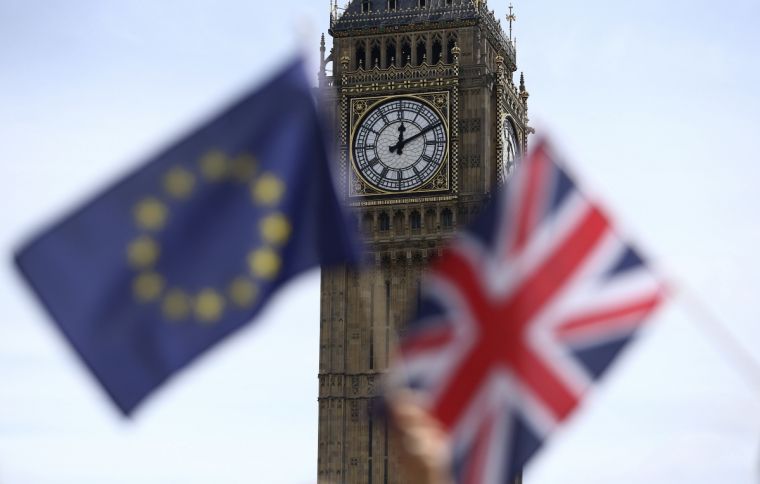6 ways to survive an EU referendum

1. Avoid dogmatic posturing
People are arguing about the referendum as if they have heaven-sent clarity and years of earthly expertise on the subject. Very few do. It's great to have opinions, but they should surely be articulated at the intensity and regularity that they warrant. In the midst of the outrageous complexity and uncertainty of an issue like this, surely our tone and willingness to hear the other side of the story should make the conversation feel more like "Do you think Chelsea or Arsenal will be stronger next season?" rather than "Did Jesus rise from the dead?"
There are times that we need to confess that we are not all experts on this, and that the idea of an 'expert' is not just an establishment conspiracy. We need 'experts'. We don't bow the knee unconditionally but we should honour our elders and those with experience. When you want your pipes fixed, you want a plumbing expert, not just someone who has read a few articles about drains on Facebook.
Hopefully you will have already noticed the Christians in Politics #disagreewell initiative including the video 'Disagree with Tea'. It challenges us (especially if we claim to be Christians) to be able to disagree while still extending arms of embrace. Let's not play the man/woman instead of the ball.
2. Cut through the spin forest to some harder facts
I would encourage you in the direction of some resource sites who have nothing to gain from wild claims and personality-driven nonsense. Take an hour out of your day and browse what Christians in Politics, the Joint Public Issues team and the Evangelical Alliance have to say about the referendum.
To be honest, as a country I think we needed longer to consider this. There is a roughly 50/50 split and the divides are along class lines, much more than along party lines. That raises much bigger, complex questions about inequality, dislocation and cosmopolitan elites than can be covered by a campaign that has only two simple answers. It feels like a married couple rushing towards a divorce or a recommitment without having taken due time to work through their issues. At that speed, whatever they decide will probably lead to longer-term problems.
But we are where we are, so here's my tuppence-worth...
3. Don't lose sight of the big picture
There are many challenges facing us as a human race. I will pick three huge ones as examples.
1. Climate change – is not a future problem. It is a present reality and the poorest nations of our world are affected the most.
2. Global terrorism – yes, we must also tackle its root causes, but you cannot avoid the fact that the capacity of terror-mongers is increasing.
3. Unbridled capitalism – multinational corporations and financial institutions enjoying the privileges of doing business across frontiers without accepting some of the responsibilities of doing so, leading to the risk of further financial crises
These are three of the most important global challenges which can only be mitigated effectively by global solutions involving co-operation between nations. This will become much more difficult without cross-national bodies like the EU. Within them, ongoing meaningful relationships can be built that allow healthy negotiation, and the finding of common cause. It's the difference between a marriage covenant and some sort of flaky "we're dating" arrangement. The work required to negotiate every turn of events or global treaty as individual nations could drown a government in administration.
A good example of this co-operation is the fact that the EU has been able to hold large multinational corporations like Google, Starbucks, McDonalds and Vodafone to account, with regard to paying their taxes and treating their workers well, in a way that individual nation states have not been able to. There is strength in numbers. Some are saying that we need to 'take back control', but the much larger loss of control in our lives is to unelected huge financial institutions, banks and corporations. They have a much larger impact on our lives than the EU. Only through national governments working in partnership can we 'take back control' from the world of global high finance; their profligacy was after all the reason for the huge global recession which continues to impact many. When Barack Obama or George Osborne give speeches, they are looking over their shoulders to see how the markets will react. It is pretty clear who is really in charge.
We understand this principle of co-operation as Christians. Your area probably has a 'Churches Together' entity. You won't agree with all the other churches in your area on everything, but there are things you do together better than doing them separately. The explosion of shared foodbanks, refugee centres, or homeless night shelters over the last few years is testimony to this sort of covenantal relationship-building. You come together to take on problems that demand a wider response. When your local council needs folks to volunteer for events they speak to the Churches Together committee. When churches want to make representation to the council, their voice is stronger because they speak together. Yes you could speak to the council individually or run your own foodbanks separately, but it would be much less effective, and much less relationship and understanding would be won. You also learn from others who are not like you. Sometimes our neighbours have wisdom.So much of the bluster of 'taking back control' is based on the arrogant presumption that we as the UK get everything right, or worse still will inevitably be right on all issues simply because of our history. Which leads us to point 4.
4. Beware nationalism
I want to celebrate patriotism. It is a healthy thing. But just as we must cling lightly to earthly identities such as doctors, teachers, builders, parents, or pastors in light of our primary identity as children of God, so we must hold lightly to our national identities. Coming from Northern Ireland I know this all too well. When someone is grounded in their identity in Christ, they can see earthly loyalties and identities for what they are – necessary, but secondary. But without that centredness of identity in him we cling more tightly to tribal identities to gain a sense of purpose and belonging. We thereby ascribe too much importance to them – be that a political party, a flag, or a football team. That's when things can get ugly. That's called idolatry.
In some ways, nationalism is just the national version of the personal selfishness and individualism that affects all of us. "Me first" multiplied by 60 million becomes "us first". But as believers are we not called to another way? A national desire to build walls and protect ourselves from the outsider at all costs makes little sense if we personally aspire to be agents of Christ's hospitality.
We need to move away from individualistic nationalism towards a humble spirit of co-operation with the other nations with whom we share this planet. My dear friend Dave Landrum says, "Nationalism never leads to a good place" and if you need a further warning just look at the American presidential race. I understand the frustrations of people who are looking for a scapegoat for economic woes, but retreating to the safety of our own turf in a globalised age is a recipe for disaster.
We need more cross-border bodies, not less. And yes, they should of course be as accountable and democratic as possible, but without these cross-border alliances we are sitting ducks waiting to be picked off by a global market that has an insatiable appetite for the weakest. That's how markets work. In the context of China and India's people power, we are unwise to leave ourselves even more exposed than we already are.
5. Remember we live in a fallen world
The EU is far from perfect. But the world is far from perfect. Surprise, surprise, the UK is far from perfect, and even more surprisingly, I am far from perfect.
Any human institution is in its very nature fallen, and though I am aware of the unimpressive aspects of the EU, if you took many of the arguments being made in favour of Brexit to their logical conclusion, then we should not only be leaving the EU, we should also be leaving the UK, leaving planet earth, and perhaps leaving our sorry lives too. Imperfection is not a reason for leaving. Abuse is a reason for leaving. But I don't believe that case has been made.
I will confess that there are aspects of the EU that make me very uncomfortable. In the early days of monetary union it bought into a brand of neoliberal economics which has been found wanting both in morality and in practice. But in more recent times our partners on mainland Europe have been quicker to react to the need for some boundaries for the wild animal that is an unbridled free market, endorsing measures such as a Financial Transaction Tax, better known as the Robin Hood Tax. The dreams that some had of a superstate have been trumped by reality.
6. Remember Rupert

I will leave my last words, (as I almost never do) to Rupert Murdoch, the media mogul and owner of Fox News. When asked why he didn't like the EU he said this, "I can walk into Downing Street and they do what I tell them. I can't do that with the EU."
That's as good a reason to REMAIN as any for me.
So that's just a little taste of what I think, but I'm not claiming divine wisdom or biblical backing, so I'm keen to hear what you think too.
And here are some of our members and other experts' views...
Andy Flannagan is director of Christians on the Left and one of the directors of Christians in Politics. Follow him on Twitter @andyflannagan











